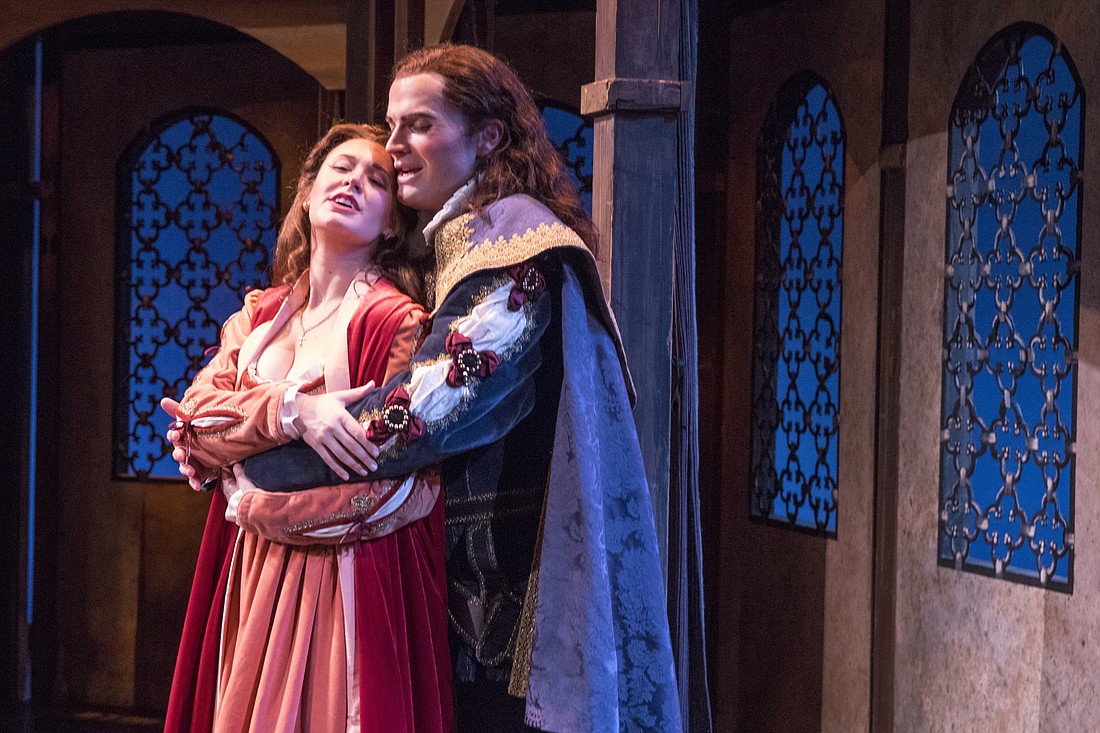- February 9, 2026
-
-
Loading

Loading

Romeo and Juliet have been enjoying quite a run in Sarasota this season, with the touring performances by the second-year members of the FSU/Asolo Conservatory for Actors Training and the Prokofiev Ballet music recently performed by the Chicago Symphony. Now, to really top it all off, the Sarasota Opera is presenting Charles Gounod’s opera “Roméo et Juliette” as the second offering in their “Season of Love.” The opera has been out of the company repertoire since 1993, so to many in the capacity opera house audience, it was a new experience.
Once again the Sarasota Opera gives us a production that could rarely be equaled outside of one or two major international houses, and even then I seriously doubt they would be able to tell this timeless love story with the ardor and intensity of the performance I saw on opening night.
It was beautifully staged by the amazing Martha Collins in a Globe Theater-styled modular set, which changed and morphed from ballroom to outdoors and from village square to tomb with simplicity yet great effectiveness.
“Roméo and Juliette” once again shows how music both advances and enhances a story we all know so well. Gounod poured forth melody after melody in arias, duets, and ensembles, giving us snippets of music in reprise just to remind us of what had passed earlier. The entire opera is a wonderful and living example of French lyric theater at its best.
Hanna Brammer as Juliette and Andrew Surrena as Roméo are both veterans and products of Sarasota Opera’s Apprentice and Studio Artist Programs, graduating into full artist status and appearing in last season’s “Magic Flute.”
Brammer has a lovely, bright sound and an enviable flexibility that makes her coloratura passages flow like water, glistening all the while. Surrena’s fine lyric tenor captures all the ardor and immediacy of their instant yet fateful love. Both were in fine voice and their love duets were beautifully sung and quite believable.
Matthew Hanscom returned as a blustery, short-tempered but faithful Mercutio, singing his aria of Queen Mab with dexterity, and Ricardo Lugo was a full voiced basso as Friar Laurence, whose sympathy and care for the lovers dominated his scenes.
In a bit of luxurious casting, the role of Juliette’s nurse, Gertrude, was sung by Lisa Chavez with warmth and sympathy, quite unlike her fiery Carmen a season or so back. Roméo’s page, Stéphano, was sung by Yvonne Trobe, who almost stole the show with her well sung-aria and effective sword play with the Tybalt of Samuel Schlievert.
The roles of Paris, Benvoglio, Grégorio and the Duke of Verona were ably performed by apprentices Joseph Beutel, Ganson Salmon, Michael Gracco and Christopher Nazarian.
Everything was guided by the musical leadership of conductor Anthony Barrese, who kept the melody and passion flowing throughout the evening. He handled the romantic moments with tenderness and the tense ones with gusto, allowing the singers to expand their emotions while keeping everything moving toward the inevitable end. The orchestra played beautifully, especially the cello quartet’s playing of the sumptuous love theme.
Jesse Martins’ chorus of apprentices sang with great clarity and diction, especially in the prologue of the opening scene. They could also be thrilling to the point of almost overpowering us when they were singing for “Justice” in the large choral finale of Act 2.
Choreography for the ball scene in Act 1 was by Tania Vergara, and India Marie Paul was the fight choreographer.
The modular set was from Virginia Opera by Peter Dean Beck, once again with magical, musical lighting by Ken Yunker, and Howard Tsvi Kaplan chose his excellent costumes from the treasure trove that is the Sarasota Opera Costume Studio.
I happen to prefer “Roméo et Juliette” over Gounod’s “Faust,” primarily because the plot is more linear than the episodic Goethe opera, and seems to offer more opportunities for an abundance of just beautiful melody and singing.
So if you want to complete your trilogy of the tragedy of Romeo and Juliet, you should by all means include this absolutely first-rate production. As they say, “Worth a special trip.”